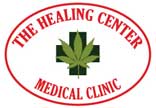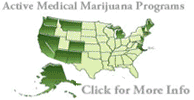About Us
The Healing Center Medical Clinic (THCMC) provides professional and confidential medical cannabis evaluations and education. It is our goal to create a comfortable and stress-free environment for patients that wish to acquire their medical cannabis recommendation and ID card. We are able to answer questions and extend our knowledge to inquiring patients, however it is important to understand that our doctors are consulting with patients solely about their qualification for medicinal cannabis.
There are more than 60 chemical compounds known as cannabinoids in the marijuana plant. Cannabinoids interact with your body by way of naturally occurring cannabinoid receptors embedded in cell membranes throughout your body. There are cannabinoid receptors in your brain, lungs, liver, kidneys, immune system and more; both the therapeutic and psychoactive properties of marijuana occur when a cannabinoid (such as the THC produced by the cannabis plant) activates a cannabinoid receptor. Your body also has naturally occurring endocannabinoids that stimulate your cannabinoid receptors and produce a variety of important physiologic processes, far beyond that of the traditional “highs” associated with THC. What is amazing is that your body is actually hard-wired to respond to cannabinoids through this unique cannabinoid receptor system; research is still ongoing on just how extensive their impact is on our health, but to date it’s known that cannabinoid receptors play an important role in many body processes, including metabolic regulation, cravings, pain, anxiety, bone growth, and immune function.
Medical Cannabis can provide benefits for a wide variety of ailments and conditions including but not limited to:
|
|
“The powers not delegated to the United States by the Constitution, nor prohibited by it to the States, are reserved to the States respectively, or to the people.” Some might argue that the U.S. Constitution delegates powers to the feds to arrest MMJ providers because of the schedule 1 status of cannabis in the Controlled Substance Act . However, the CSA’s schedule 1 requirements are: “1) Schedule I.– (A) The drug or other substance has a high potential for abuse. (B) The drug or other substance has no currently accepted medical use in treatment in the United States. (C) There is a lack of accepted safety for use of the drug or other substance under medical supervision.” Clearly, cannabis doesn’t qualify on B and C, and the Merck Medical Manual of Diagnosis and Treatment clearly states that cannabis is not physically addictive, so it doesn’t meet criteria for A either.
Conclusion: The power to regulate MMJ is not delegated to the federal government because it does not meet their own criteria to be a schedule 1 drug. Therefore, they have no power to regulate it and must reclassify or remove it from the list. Isn’t it ironic that tobacco meets all three criteria of the CSA Schedule 1, and yet, tobacco companies are instrumental in preventing the consumption of the non-addictive, medically safe and effective cannabis (visualize outstretched politician’s hands)? Meanwhile, tobacco, which clearly meets all three criteria of a schedule 1 drug (A) highly physically addictive, B) no medical use, C) not safe even when used under the directions of a physician and in fact proven to cause cancer), is legal, sold for a hefty profit, and the profits consequently used to influence the decisions of politicians making laws. When will the Fed arrest Big Tobacco???
Sincerely,
The Healing Center Medical Clinic Staff
Read More













